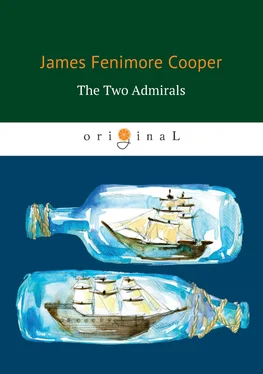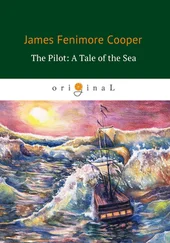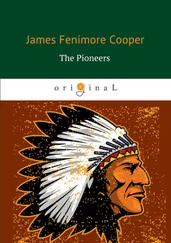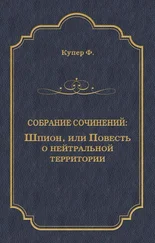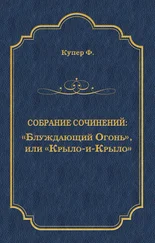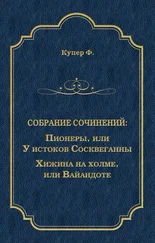Джеймс Фенимор Купер - The Two Admirals
Здесь есть возможность читать онлайн «Джеймс Фенимор Купер - The Two Admirals» — ознакомительный отрывок электронной книги совершенно бесплатно, а после прочтения отрывка купить полную версию. В некоторых случаях можно слушать аудио, скачать через торрент в формате fb2 и присутствует краткое содержание. Город: Москва, Год выпуска: 2018, ISBN: 2018, Жанр: Исторические приключения, Прочие приключения, literature_19, Морские приключения, на английском языке. Описание произведения, (предисловие) а так же отзывы посетителей доступны на портале библиотеки ЛибКат.
- Название:The Two Admirals
- Автор:
- Жанр:
- Год:2018
- Город:Москва
- ISBN:978-5-521-06651-3
- Рейтинг книги:3 / 5. Голосов: 1
-
Избранное:Добавить в избранное
- Отзывы:
-
Ваша оценка:
- 60
- 1
- 2
- 3
- 4
- 5
The Two Admirals: краткое содержание, описание и аннотация
Предлагаем к чтению аннотацию, описание, краткое содержание или предисловие (зависит от того, что написал сам автор книги «The Two Admirals»). Если вы не нашли необходимую информацию о книге — напишите в комментариях, мы постараемся отыскать её.
The Deerslayer
The Two Admirals — читать онлайн ознакомительный отрывок
Ниже представлен текст книги, разбитый по страницам. Система сохранения места последней прочитанной страницы, позволяет с удобством читать онлайн бесплатно книгу «The Two Admirals», без необходимости каждый раз заново искать на чём Вы остановились. Поставьте закладку, и сможете в любой момент перейти на страницу, на которой закончили чтение.
Интервал:
Закладка:
This was said with seeming indifference, though with great art. Sir Wycherly’s principal weakness was an overweening and an ignorant admiration of his own country, and all it contained. He was also strongly addicted to that feeling of contempt for the dependencies of the empire, which seems to be inseparable from the political connection between the people of the metropolitan country and their colonies. There must be entire equality, for perfect respect, in any situation in life; and, as a rule, men always appropriate to their own shares, any admitted superiority that may happen to exist on the part of the communities to which they belong. It is on this principle, that the tenant of a cock-loft in Paris or London, is so apt to feel a high claim to superiority over the occupant of a comfortable abode in a village. As between England and her North American colonies in particular, this feeling was stronger than is the case usually, on account of the early democratical tendencies of the latter; not, that these tendencies had already become the subject of political jealousies, but that they left social impressions, which were singularly adapted to bringing the colonists into contempt among a people predominant for their own factitious habits, and who are so strongly inclined to view everything, even to principles, through the medium of arbitrary, conventional customs. It must be confessed that the Americans, in the middle of the eighteenth century, were an exceedingly provincial, and in many particulars a narrow-minded people, as well in their opinions as in their habits; nor is the reproach altogether removed at the present day; but the country from which they are derived had not then made the vast strides in civilization, for which it has latterly become so distinguished. The indifference, too, with which all Europe regarded the whole American continent, and to which England, herself, though she possessed so large a stake on this side of the Atlantic, formed no material exception, constantly led that quarter of the world into profound mistakes in all its reasoning that was connected with this quarter of the world, and aided in producing the state of feeling to which we have alluded. Sir Wycherly felt and reasoned on the subject of America much as the great bulk of his countrymen felt and reasoned in 1745; the exceptions existing only among the enlightened, and those whose particular duties rendered more correct knowledge necessary, and not always among them. It is said that the English minister conceived the idea of taxing America, from the circumstance of seeing a wealthy Virginian lose a large sum at play, a sort of argumentum ad hominem that brought with it a very dangerous conclusion to apply to the sort of people with whom he had to deal. Let this be as it might, there is no more question, that at the period of our tale, the profoundest ignorance concerning America existed generally in the mother country, than there is that the profoundest respect existed in America for nearly every thing English. Truth compels us to add, that in despite of all that has passed, the cis-atlantic portion of the weakness has longest endured the assaults of time and of an increased intercourse.
Young Wycherly, as is ever the case, was keenly alive to any insinuations that might be supposed to reflect on the portion of the empire of which he was a native. He considered himself an Englishman, it is true; was thoroughly loyal; and was every way disposed to sustain the honour and interests of the seat of authority; but when questions were raised between Europe and America, he was an American; as, in America itself, he regarded himself as purely a Virginian, in contradistinction to all the other colonies. He understood the intended sarcasm of Tom Wychecombe, but smothered his resentment, out of respect to the baronet, and perhaps a little influenced by the feelings in which he had been so lately indulging.
“Those gentlemen who are disposed to fancy such things of the colonies, would do well to visit that part of the world,” he answered, calmly, “before they express their opinions too loudly, lest they should say something that future observation might make them wish to recall.”
“True, my young friend – quite true,” put in the baronet, with the kindest possible intentions. “True as gospel. We never know any thing of matters about which we know nothing; that we old men must admit, Master Dutton; and I should think Tom must see its force. It would be unreasonable to expect to find every thing as comfortable in America as we have it here, in England; nor do I suppose the Americans, in general, would be as likely to get over a cliff as an Englishman. However, there are exceptions to all general rules, as my poor brother James used to say, when he saw occasion to find fault with the sermon of a prelate. I believe you did not know my poor brother, Dutton; he must have been killed about the time you were born – St. James, I used to call him, although my brother Thomas, the judge that was Tom’s father, there – said he was St. James the Less.”
“I believe the Rev. Mr. Wychecombe was dead before I was of an age to remember his virtues, Sir Wycherly,” said Dutton, respectfully; “though I have often heard my own father speak of all your honoured family.”
“Yes, your father, Dutton, was the attorney of the next town, and we all knew him well. You have done quite right to come back among us to spend the close of your own days. A man is never as well off as when he is thriving in his native soil; more especially when that soil is old England, and Devonshire. You are not one of us, young gentleman, though your name happens to be Wychecombe; but, then we are none of us accountable for our own births, or birth-places.”
This truism, which is in the mouths of thousands while it is in the hearts of scarcely any, was well meant by Sir Wycherly, however plainly expressed. It merely drew from the youth the simple answer that – “he was born in the colonies, and had colonists for his parents;” a fact that the others had heard already, some ten or a dozen times.
“It is a little singular, Mr. Wychecombe, that you should bear both of my names, and yet be no relative,” continued the baronet. “Now, Wycherly came into our family from old Sir Hildebrand Wycherly, who was slain at Bosworth Field, and whose only daughter, my ancestor, and Tom’s ancestor, there, married. Since that day, Wycherly has been a favourite name among us. I do not think that the Wychecombes of Herts, ever thought of calling a son Wycherly, although, as my poor brother the judge used to say, they were related, but of the half-blood, only. I suppose your father taught you what is meant by being of the half-blood, Thomas?”
Tom Wychecombe’s face became the colour of scarlet, and he cast an uneasy glance at all present; expecting in particular, to meet with a look of exultation in the eyes of the lieutenant. He was greatly relieved, however, at finding that neither of the three meant or understood more than was simply expressed. As for his uncle, he had not the smallest intention of making any allusion to the peculiarity of his nephew’s birth; and the other two, in common with the world, supposed the reputed heir to be legitimate. Gathering courage from the looks of those around him, Tom answered with a steadiness that prevented his agitation from being detected:
“Certainly, my dear sir; my excellent parent forgot nothing that he thought might be useful to me, in maintaining my rights, and the honour of the family, hereafter. I very well understand that the Wychecombes of Hertfordshire have no claims on us; nor, indeed, any Wychecombe who is not descended from my respectable grandfather, the late Sir Wycherly.”
“He must have been an early , instead of a late Sir Wycherly, rather, Mr. Thomas,” put in Dutton, laughing at his own conceit; “for I can remember no other than the honourable baronet before us, in the last fifty years.”
Читать дальшеИнтервал:
Закладка:
Похожие книги на «The Two Admirals»
Представляем Вашему вниманию похожие книги на «The Two Admirals» списком для выбора. Мы отобрали схожую по названию и смыслу литературу в надежде предоставить читателям больше вариантов отыскать новые, интересные, ещё непрочитанные произведения.
Обсуждение, отзывы о книге «The Two Admirals» и просто собственные мнения читателей. Оставьте ваши комментарии, напишите, что Вы думаете о произведении, его смысле или главных героях. Укажите что конкретно понравилось, а что нет, и почему Вы так считаете.
